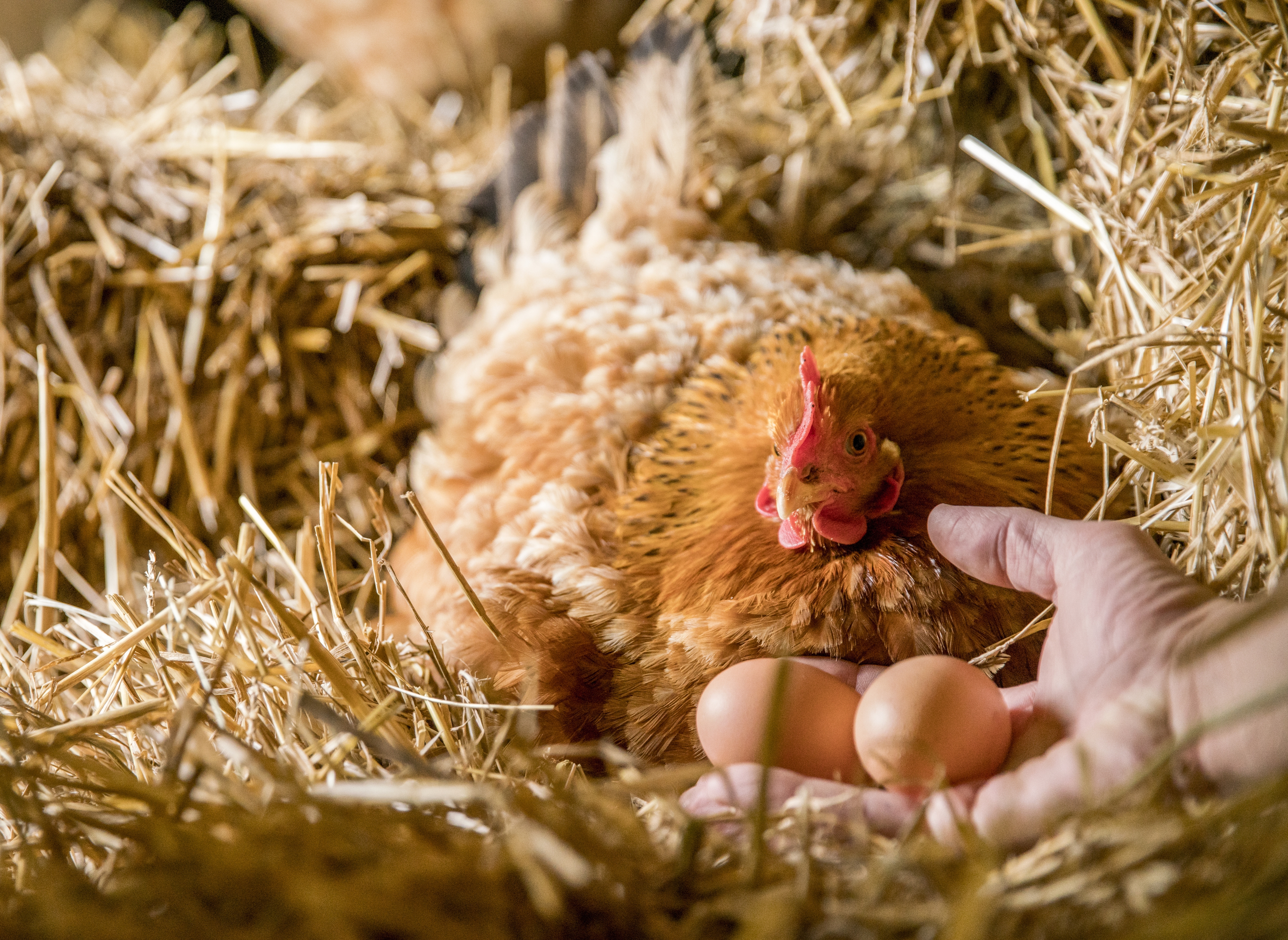Egg (hen)
Eggs are so familiar, so common, so abundant. They represent life, renewal, fertility, and fortune. To many people, eggs are consumed nearly daily but at the same time, eggs can be very special. Their properties allow for a multitude of uses. In French, eggs are oeuf(s).

About
Eggs are laid by female birds. Eggs are the unfertilized and therefore undeveloped baby bird. Whereas different types of birds can lay eggs, when we use the word "egg" we refer to those laid by hens; female chickens. Some other types of eggs that are much less common are: duck eggs, quail eggs, pigeon, turkey, or goose eggs.
Eggs are composed of:
- shell (which is porous)
- shell membrane (thin lining just under the shell)
- chalaza (the white cord that holds the yolk suspended in the centre)
- albumen (egg white)
- air cell or air pocket (to allow for the chick's first breath of air should it have reached maturity)
- vitelline membrane (lining of the egg yolk)
- egg yolk (yellow portion)
- germinal disc (2-3mm white disc on the outside of the yolk where sperm would enter the egg and where the embryo would develop)
In Canada, the CFIA grades eggs as either A, B, or C. It is based on outside and inside characteristics. To evaluate the inside composition as well as to look for cracks, plants use a technique called candling. Grading is done for uniformity and to meet consumer expectations. Eggs at the supermarket are Grade A. Lesser grades are used in commercial baking for the most part.
Market Forms
- fresh (in-shell)
- frozen (cracked liquid eggs)
- dehydrated (egg powder for baking)
- liquid (in a carton, mostly for large production)
- liquid yolks (for pastry cooking mainly)
- liquid egg white
Nutrition
Eggs are very nutritious. They are high in protein (egg whites), contain vitamins and minerals, and fat (yolk). However since the fat is saturated, we should still not consume egg yolks in excess.
Food Safety
Since coming from the intestine of chickens, eggs can potentially contain harmful salmonella. Egg shells are cleaned in packing houses however if they are not fully cleaned, or are contaminated afterwards, bacteria can enter through small cracks in the eggs. That is why it is advised that pregnant women and others with certain health conditions make sure to only consume eggs which have been fully cooked. It is possible to pasteurize eggs on your own by bringing eggs to 60 degrees C for at least 3 minutes and 30 seconds.
Eggs should be stored in the refrigerator and can last one month if store properly.
History and Cultural Significance
Alberta has a somewhat large population of Ukrainian (as well as other eastern European groups). The Ukrainians brought their food culture of pysanki and krashanky, Ukrainian Easter eggs, to the province. The eggs are painted and decorated with folk motifs and are identifiable. (Canadian Food Words, p 218).
Ways to Cook
Eggs are extremely versatile! They are a staple in every kitchen: hot or cold, bakery and pastry kitchens too. If you have eggs on hand, you can make:
- hard boiled eggs for cold sandwiches, canapes, devilled eggs, egg salad, main course salads
- breakfast preparations (over easy, over medium, over hard, sunny side up, basted eggs, shirred eggs, eggs en cocotte, poached eggs, omelettes
- brunch items such as frittatas, quiches, eggs Benedict
- other lunch and main course items such as shakshuka, hot sandwiches, and poached eggs on top of protein bowls
- cold sauces such as mayonnaise (permanent emulsion) or coddled and emulsified and puréed such as with spinach
- baked or battered goods such as pancakes, waffles, cakes, muffins, cookies
- meringues, mousses, bavarian cream
- ice cream and frozen custards
- cheese cake
- egg noodles
- brioche and high-fat bread doughs
- egg-wash for topping pies, pâtés and other baked goods
- hollandaise sauce
- used as a binder in forcemeats, meat loaf, meat balls
- fried and topped onto rice dishes, veggies dishes, noodles dishes
Allergen Alert
Eggs are one of the top 10 food allergens in Canada - https://foodallergycanada.ca/allergies/egg/
More on Cooking with Eggs
Some of our favourite videos

Alberta Egg Producers
Green Valley Acres
About this producerJasper Springs Farm
About this producerFoods from this producer:
Meadow Creek Farms
About this producerFoods from this producer:
Herbert Family Farm
About this producerFoods from this producer:
Coen Farm
About this producerFoods from this producer:
Serben Farms
About this producerFoods from this producer:
Broxburn Vegetables
About this producerFoods from this producer:
-
- Vegetables
Tomatoes
-
- Vegetables
- Tender-Fruited Vegetables
Eggplant
-
- Vegetables
Cucumber
-
- Vegetables
Lettuce
-
- Vegetables
Green Bean
-
- Fruit
Raspberry
-
- Vegetables
Onion
-
- Vegetables
- Cabbage Family
Broccoli
-
- Domesticated
- Feather
Egg (hen)
-
- Vegetables
- Cabbage Family
Cabbage
-
- Vegetables
- Tender-Fruited Vegetables
Pepper
-
- Herbs & Spices & Flavourings
Coriander
-
- Herbs & Spices & Flavourings
- Culinary Herb
Dill
-
- Vegetables
- Onion Family/Aliums
Garlic
-
- Vegetables
- Leafy Greens
Kale
-
- Vegetables
- Onion Family/Aliums
Leek
-
- Vegetables
Winter Squash
-
- Vegetables
Potatoes
Desert Springs Farm
About this producerFoods from this producer:
Sunshine Organic Farm
About this producerHomesteader Farms
About this producerFoods from this producer:
-
- Domesticated
- Feather
Egg (hen)
-
- Domesticated
- Fur
Beef
-
- Domesticated
- Fur
Lamb
-
Honey
-
- Vegetables
Potatoes
-
- Vegetables
- Roots and Tubers
Carrots
-
- Vegetables
- Roots and Tubers
Parsnip
-
- Vegetables
- Roots and Tubers
Beet
-
- Vegetables
Corn
-
- Vegetables
Cucumber
-
- Vegetables
Pumpkin
-
- Vegetables
Tomatoes
-
- Vegetables
Pea
-
- Vegetables
Green Bean
-
- Vegetables
Lettuce
-
- Vegetables
- Roots and Tubers
Radish
-
- Vegetables
Onion
-
- Herbs & Spices & Flavourings
- Culinary Herb
Dill
-
- Vegetables
- Cabbage Family
Cabbage
-
- Vegetables
- Cabbage Family
Broccoli
-
- Vegetables
Zucchini
-
- Fruit
Rhubarb
Backwoods Buffalo Ranch
About this producerFoods from this producer:
Grazed Right Grass Fed Beef
About this producerFoods from this producer:
Prairie Gardens
About this producerFoods from this producer:
-
- Vegetables
Potatoes
-
- Vegetables
Pumpkin
-
- Domesticated
- Feather
Egg (hen)
-
- Vegetables
- Onion Family/Aliums
Garlic
-
- Vegetables
Cucumber
-
- Vegetables
- Cabbage Family
Cabbage
-
- Herbs & Spices & Flavourings
- Culinary Herb
Dill
-
- Vegetables
Corn
-
- Vegetables
- Leafy Greens
Kale
-
- Vegetables
Chard
-
- Vegetables
- Roots and Tubers
Beet
-
- Vegetables
Zucchini
-
- Vegetables
Lettuce
-
- Vegetables
Onion
-
- Vegetables
- Onion Family/Aliums
Leek
-
- Vegetables
Winter Squash
Hoven Farms
About this producerFoods from this producer:
The Saskaberry Ranch
About this producerStonepost Farms
About this producerMans Organics
About this producerEwe-Nique Farms
About this producerFoods from this producer:
Sunworks Farm
About this producer-
Green Valley Acres
Green Valley Acres, Alberta 41, Irvine, AB, Canada
-
Jasper Springs Farm
Jasper Springs Farm, Range Road 71, Seba Beach, AB, Canada
-
Meadow Creek Farms
Meadow Creek Farms, Waskatenau, AB, Canada
-
Herbert Family Farm
Herbert Family Farm, Range Road 201, Edberg, AB, Canada
-
Coen Farm
Coen Farm, Ferintosh, AB, Canada
-
Serben Farms
Serben Farms, Smoky Lake, AB, Canada
-
Broxburn Vegetables
Broxburn Vegetables & Cafe, Lethbridge County, AB, Canada
-
Desert Springs Farm
Desert Springs Farm, 6 Avenue Southwest, Medicine Hat, AB, Canada
-
Sunshine Organic Farm
Sunshine Organic Farm, Range Road 34, Warburg, AB, Canada
-
Homesteader Farms
Homesteader Farms, Yellowhead County, Township Road 563A, Yellowhead County, AB, Canada
-
Backwoods Buffalo Ranch
Backwoods Buffalo Ranch, Woodlands County, AB, Canada
-
Grazed Right Grass Fed Beef
Grazed Right, Black Diamond, AB, Canada
-
Prairie Gardens
Prairie Gardens, Lily Lake Road, Bon Accord, AB, Canada
-
Hoven Farms
Hoven Farms Grass Finished Organic Beef, Eckville, AB, Canada
-
The Saskaberry Ranch
The Saskaberry Ranch, Township Road 324, Mountain View County, AB, Canada
-
Stonepost Farms
Stonepost Farms, Range Road 105, Wildwood, AB, Canada
-
Mans Organics
Mans Organics, Coaldale, AB, Canada
-
Ewe-Nique Farms
Champion, AB, Canada
-
Sunworks Farm
Sunworks Farms, Armena, AB, Canada
